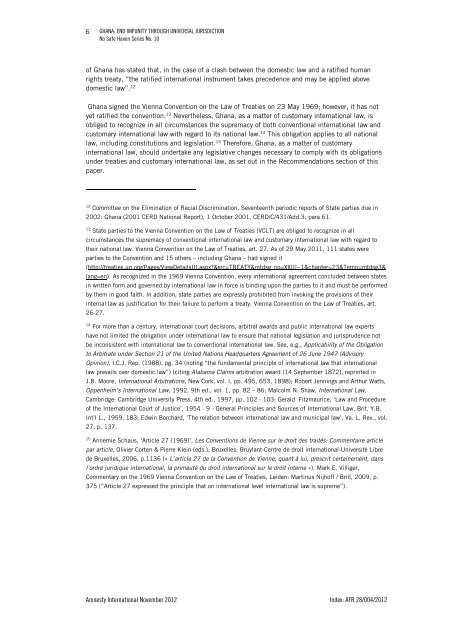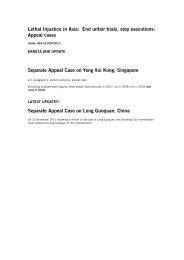Ghana - Amnesty International
Ghana - Amnesty International
Ghana - Amnesty International
You also want an ePaper? Increase the reach of your titles
YUMPU automatically turns print PDFs into web optimized ePapers that Google loves.
6GHANA: END IMPUNITY THROUGH UNIVERSAL JURISDICTIONNo Safe Haven Series No. 10of <strong>Ghana</strong> has stated that, in the case of a clash between the domestic law and a ratified humanrights treaty, “the ratified international instrument takes precedence and may be applied abovedomestic law”. 12<strong>Ghana</strong> signed the Vienna Convention on the Law of Treaties on 23 May 1969; however, it has notyet ratified the convention. 13 Nevertheless, <strong>Ghana</strong>, as a matter of customary international law, isobliged to recognize in all circumstances the supremacy of both conventional international law andcustomary international law with regard to its national law. 14 This obligation applies to all nationallaw, including constitutions and legislation. 15 Therefore, <strong>Ghana</strong>, as a matter of customaryinternational law, should undertake any legislative changes necessary to comply with its obligationsunder treaties and customary international law, as set out in the Recommendations section of thispaper.12Committee on the Elimination of Racial Discrimination, Seventeenth periodic reports of State parties due in2002: <strong>Ghana</strong> (2001 CERD National Report), 1 October 2001, CERD/C/431/Add.3, para 61.13State parties to the Vienna Convention on the Law of Treaties (VCLT) are obliged to recognize in allcircumstances the supremacy of conventional international law and customary international law with regard totheir national law. Vienna Convention on the Law of Treaties, art. 27. As of 29 May 2011, 111 states wereparties to the Convention and 15 others – including <strong>Ghana</strong> – had signed it(http://treaties.un.org/Pages/ViewDetailsIII.aspx?&src=TREATY&mtdsg_no=XXIII~1&chapter=23&Temp=mtdsg3&lang=en). As recognized in the 1969 Vienna Convention, every international agreement concluded between statesin written form and governed by international law in force is binding upon the parties to it and must be performedby them in good faith. In addition, state parties are expressly prohibited from invoking the provisions of theirinternal law as justification for their failure to perform a treaty. Vienna Convention on the Law of Treaties, art.26-27.14For more than a century, international court decisions, arbitral awards and public international law expertshave not limited the obligation under international law to ensure that national legislation and jurisprudence notbe inconsistent with international law to conventional international law. See, e.g., Applicability of the Obligationto Arbitrate under Section 21 of the United Nations Headquarters Agreement of 26 June 1947 (AdvisoryOpinion), I.C.J. Rep. (1988), pg. 34 (noting “the fundamental principle of international law that internationallaw prevails over domestic law”) (citing Alabama Claims arbitration award (14 September 1872), reprinted inJ.B. Moore, <strong>International</strong> Arbitrations, New Cork, vol. I, pp. 495, 653, 1898); Robert Jennings and Arthur Watts,Oppenheim’s <strong>International</strong> Law, 1992, 9th ed., vol. 1, pp. 82 – 86; Malcolm N. Shaw, <strong>International</strong> Law,Cambridge: Cambridge University Press, 4th ed., 1997, pp. 102 - 103; Gerald Fitzmaurice, ‘Law and Procedureof the <strong>International</strong> Court of Justice’, 1954 - 9 - General Principles and Sources of <strong>International</strong> Law, Brit. Y.B.Int’l L., 1959, 183; Edwin Borchard, ‘The relation between international law and municipal law’, Va. L. Rev., vol.27, p. 137.15Annemie Schaus, ‘Article 27 (1969)’, Les Conventions de Vienne sur le droit des traités: Commentaire articlepar article, Olivier Corten & Pierre Klein (eds.), Bruxelles: Bruylant-Centre de droit international-Université Librede Bruxelles, 2006, p.1136 (« L’article 27 de la Convention de Vienne, quant à lui, prescrit certainement, dansl’ordre juridique international, la primauté du droit international sur le droit interne »). Mark E. Villiger,Commentary on the 1969 Vienna Convention on the Law of Treaties, Leiden: Martinus Nijhoff / Brill, 2009, p.375 (“Article 27 expressed the principle that on international level international law is supreme”).<strong>Amnesty</strong> <strong>International</strong> November 2012 Index: AFR 28/004/2012
















